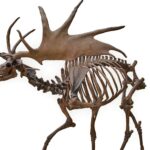New Scientist
Image: Matthew Fang
We are used to thinking about how evolution selects for a wide range of physical traits, but the idea that natural selection could favour a quality as abstract as information content takes some getting used to.
It’s something that physicist William Bialek at Princeton University takes in his stride, by thinking about organisms as computers. “How well we do in life depends on our actions matching the external conditions,” he says. “But actions come from ‘inside’, so they must be based on some internal variables.”
In other words, an organism that embodies some knowledge about its environment is in a better position to exploit environmental resources and optimise its growth potential, says Bialek. He likens it to the way a seasoned poker player who understands the rules and subtleties of the game wins more than a novice.
Bialek’s team has formalised this line of thinking, using the single-celled bacterium Escherichia coli as a model. Each bacterium uses lac proteins to break down its food, the sugar lactose. Protein production is a costly business, so overproduction harms the organism’s survival prospects. A bacterium that “knows” how much lac protein to produce to maximise its use of available sugar will have a competitive edge over rival cells. Read more on newscientist.com…








